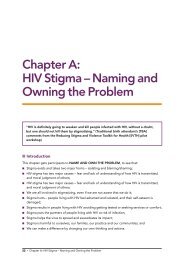Implementing Multiple Gender Strategies to Improve HIV and ... - ICRW
Implementing Multiple Gender Strategies to Improve HIV and ... - ICRW
Implementing Multiple Gender Strategies to Improve HIV and ... - ICRW
You also want an ePaper? Increase the reach of your titles
YUMPU automatically turns print PDFs into web optimized ePapers that Google loves.
ETHIOPIAN RADIO SERIAL DRAMAS TO PREVENT <strong>HIV</strong>/AIDS<br />
LEAD ORGANIZATIONS:<br />
COUNTRY:<br />
<strong>HIV</strong> PROGRAM AREA:<br />
Population Media Center (PMC)<br />
Ethiopia<br />
Prevention<br />
OVERVIEW:<br />
In Ethiopia, PMC is using radio serial dramas <strong>to</strong> promote reproductive health, provide information<br />
about preventing <strong>HIV</strong> <strong>and</strong> sexually transmitted infections, <strong>and</strong> encourage gender equity. Formative<br />
research is used <strong>to</strong> develop long-running serial radio dramas that are appropriate <strong>to</strong> the local context<br />
<strong>and</strong> encourage positive social change. In the dramas, key characters navigate real-life challenges<br />
<strong>and</strong> eventually adopt positive behaviors. Themes include living with <strong>HIV</strong> <strong>and</strong> high-risk behaviors such<br />
as multiple sex partners, drug abuse, <strong>and</strong> violence against women. Moni<strong>to</strong>ring evaluation showed a<br />
continuous increase in reproductive health clients who cited the radio program as the primary<br />
motivating fac<strong>to</strong>r for accessing services. Further, an independent evaluation showed that female<br />
respondents reported increased communication with their partner on <strong>HIV</strong> <strong>and</strong> AIDS issues, <strong>and</strong> both<br />
men <strong>and</strong> women reported being more comfortable with the idea of using condoms. The project found<br />
that it is important <strong>to</strong> address both female <strong>and</strong> male attitudes <strong>and</strong> behavior. Also, by addressing<br />
multiple issues, the dramas were able <strong>to</strong> raise awareness around an array of cultural attitudes <strong>and</strong><br />
behaviors that fuel the spread of <strong>HIV</strong>.<br />
BACKGROUND<br />
<strong>HIV</strong> & AIDS<br />
Program Goals<br />
Through evidence-based media communication, PMC uses radio serial<br />
dramas in Ethiopia <strong>to</strong> promote the use of reproductive health services,<br />
provide information about preventing <strong>HIV</strong> <strong>and</strong> AIDS <strong>and</strong> sexually<br />
transmitted infections, <strong>and</strong> encourage gender equity.<br />
<strong>Gender</strong> <strong>Strategies</strong><br />
Addressed<br />
<br />
<br />
<br />
Reducing violence <strong>and</strong> coercion<br />
Addressing male norms <strong>and</strong> behaviors<br />
Increasing women’s legal protection<br />
Increasing women’s access <strong>to</strong> income <strong>and</strong> productive resources<br />
Other: women’s empowerment, female access <strong>to</strong> education <strong>and</strong><br />
reproductive health<br />
Description of<br />
Intervention<br />
PMC developed <strong>and</strong> broadcast two radio serial dramas. Yeken Kignit<br />
(“Looking Over One’s Daily Life”) was a 257-episode radio serial drama<br />
produced <strong>and</strong> broadcast nationwide in Amharic. It was broadcast twice a<br />
week in the evenings <strong>and</strong> rebroadcast in the afternoons. Dhimbibba<br />
(“Getting the Best Out of Life”) was a 140-episode, Oromiffa language radio<br />
serial drama. Both dramas were created using the Sabido methodology for<br />
entertainment-education. This methodology, grounded in social <strong>and</strong><br />
theoretical research, is used <strong>to</strong> develop mass media serial dramas that are<br />
reality-based <strong>and</strong> adapted <strong>to</strong> local context. A formative research process<br />
identifies community values <strong>and</strong> norms <strong>and</strong> informs the development of<br />
three types of characters: positive characters (good role models), negative<br />
characters (bad role models), <strong>and</strong> transitional characters. Throughout the<br />
course of the drama, transitional characters navigate real-life challenges<br />
<strong>and</strong> eventually adopt positive behaviors (Teffera, 2008).<br />
34
















